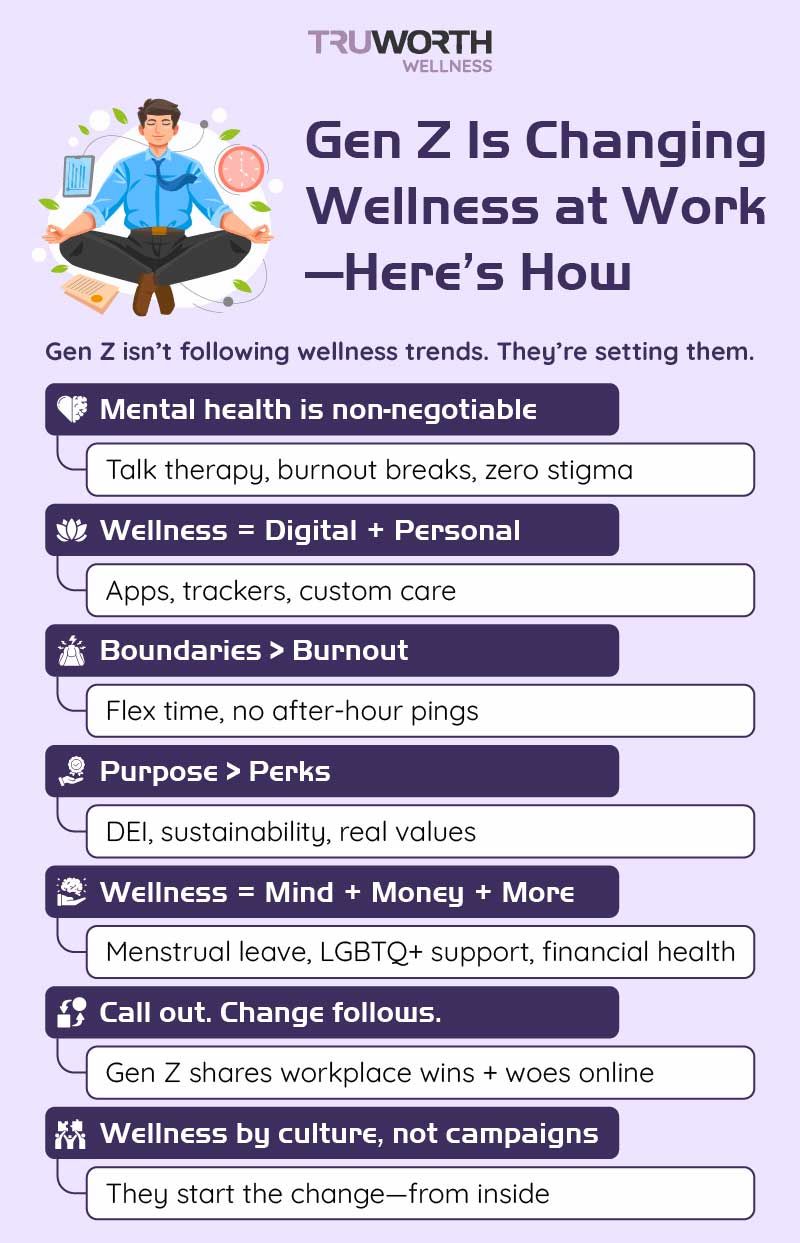How Gen Z Employees Are Transforming Workplace Wellness?

Step into any modern office, and you'll feel it—the shift in how we think about employee well-being. The conversation is no longer limited to physical health or annual health check-ups. Today, wellness means something much deeper, more personal, and more holistic. And leading this change is a group that's redefining how we work and live: Gen Z.
Born between 1997 and 2012, Gen Z employees are not just entering the workforce—they're influencing it in powerful ways. Their values, behaviors, and expectations are pushing companies to rethink what wellness really means.
Let’s explore how Gen Z is changing the corporate wellness game—and why that’s a great thing for everyone.
Must Read: How to Attract and Retain Gen Z Employees?

1. Breaking the Silence Around Mental Health
For a long time, conversations around mental health at work were awkward or nonexistent. But Gen Z? They talk about it freely.
From sharing their therapy journeys on social media to openly discussing burnout or anxiety with managers, Gen Z is normalizing mental health in ways older generations never did.
As a result:
- Companies are now offering mental health days.
- Employee Assistance Programs (EAPs) are gaining traction.
- More organizations are investing in virtual counseling and stress management sessions.
In short, Gen Z is making it okay to not be okay—and that’s opening the door for meaningful mental health support in workplaces.
2. Wellness Needs to Be Digital and Personalized
This generation grew up with smartphones, wearables, and apps for everything—from sleep tracking to meditation. So when they enter a job, they expect the same level of personalization in their wellness offerings.
Gen Z isn’t impressed by one-size-fits-all programs. They want:
- Customized fitness routines tailored to their goals.
- Nutrition tips tailored to their lifestyle.
- On-demand access to health experts, not just scheduled workshops.
This demand is pushing employers to offer digital wellness platforms that use data and AI to create personalized health journeys—making wellness smarter, not harder.

3. Work-Life Balance Is Non-Negotiable
Unlike previous generations who often glorified overwork, Gen Z is drawing a clear line between their professional and personal lives.
They're not afraid to say:
- “I don’t take calls after 7 PM.”
- “I need time off to reset.”
- “I won’t compromise my sleep for a deadline.”
And guess what? This boundary-setting is inspiring others to do the same. It’s leading to:
- Flexible work hours.
- Mandatory no-meeting days.
- More focus on quality of work, not hours logged.
Gen Z is reminding the workplace that rest is productive too.

4. Purpose Over Perks
Gone are the days when bean bags and free snacks were enough to keep employees happy. Gen Z wants something more meaningful: a sense of purpose.
They care about:
- Working for socially responsible companies.
- Being part of inclusive and equitable teams.
- Supporting causes like sustainability, mental health, and gender equality.
This shift is making companies think beyond surface-level wellness and focus on values-driven culture. DEI programs, mental health awareness weeks, and volunteer days are now becoming a part of the wellness conversation.
5. Redefining Wellness—One Bold Ask at a Time
For Gen Z, wellness isn’t just about the body. It’s about the mind, emotions, relationships, and even financial health. They expect wellness programs to cover:
- Therapy and emotional resilience.
- Menstrual leave and women’s health care.
- Financial coaching and debt management.
- LGBTQ+ inclusive support and policies.
Their broader definition of wellness is helping employers realize that true well-being is multi-dimensional, not just physical.
6. The Social Media Effect
Gen Z doesn’t just experience wellness—they talk about it. Whether it’s a toxic job culture or a company that prioritizes well-being, they’re likely to post about it on LinkedIn, Reddit, or Instagram.
This online visibility:
- Holds companies accountable.
- Highlights wellness best practices.
- Builds employer brand through real stories.
Companies are now realizing that investing in genuine wellness isn’t just good for employees—it’s great for reputation too.
7. Leading by Example
You’ll often find Gen Z employees organizing yoga breaks, starting Slack channels for mental health check-ins, or initiating sustainability challenges at work. They're not waiting for HR—they're starting the wellness conversation themselves.
By modeling positive behaviors, they’re encouraging:
- Open dialogue.
- Community-driven well-being efforts.
- Peer-led mental health advocacy.
This organic, grassroots approach makes wellness more authentic and less like a formal HR campaign.
Real Impact: Indian Workplaces Are Taking Note
Indian companies are catching on. According to reports, Gen Z and millennial employees in India are leading a healthy shift in corporate culture. From startups to public sector companies:
- More organizations are hiring mental health coaches.
- Yoga and mindfulness sessions are becoming regular.
- Menstrual leave, hybrid work models, and financial literacy sessions are now part of wellness strategies.
This isn't just a trend—it's a transformation.
Final Thoughts
Gen Z may be new to the workforce, but they’re making an outsized impact. Their emphasis on mental health, boundary-setting, inclusivity, and purpose is creating a more human-centric workplace for everyone.
Wellness is no longer a checkbox. Thanks to Gen Z, it’s becoming a culture—one where every employee is encouraged to show up as their healthiest, most authentic self.
And that’s not just good for employees—it’s great for business too.

